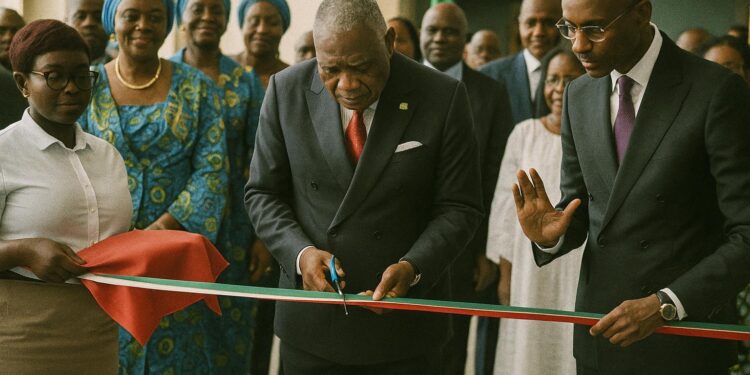Brazzaville Sets the Stage for a Cultural Pivot
From the marbled halls of the Palais des Congrès, Prime Minister Anatole Collinet Makosso opened the 12th Pan-African Music Festival symposium with a measured yet unmistakable call: transform artistic talent into a growth vector capable of loosening the grip of poverty. His appeal, delivered before an audience of musicologists, economists and diplomats, arrives at a moment when the Congolese cabinet is actively seeking to diversify revenues beyond hydrocarbons and forestry. By foregrounding culture, the government signals confidence that soft-power assets can translate into hard currency, a thesis increasingly corroborated by international bodies such as UNESCO, which estimates that creative industries generate more than 3 percent of global GDP (UNESCO 2021).
Art Education as Economic Engine
Central to Brazzaville’s roadmap is a reinforcement of formal and informal artistic training. The Prime Minister insisted that “the creative force of our cultural producers must be woven into public policy so that it becomes both a social glue and an economic lever.” Current curricular reform envisions partnerships between the National Institute of Art and regional conservatories, supplemented by masterclasses led by diaspora professionals. According to the Ministry of Technical and Vocational Education, pilot programmes in Pointe-Noire have already doubled enrolment in sound-engineering courses since 2021, a statistic that speaks to rising youth interest in employable creative skills.
Digital Platforms Reshape Revenue Streams
The symposium’s working sessions repeatedly returned to the disruptive potential of streaming services. With smartphone penetration in Congo projected to reach 45 percent by 2025, economists argue that local musicians stand at the threshold of global exposure. Minister Marie France Hélène Lydie Pongault stressed that digital literacy must accompany artistic prowess so that artists can monetise their catalogues without ceding ownership. Her ministry is finalising a memorandum with two pan-African streaming firms to ensure fair-value accounting, an initiative loosely modelled on South Africa’s mechanical-rights clearinghouse.
International data reinforce the minister’s optimism. The IFPI Global Music Report notes that sub-Saharan Africa was the world’s fastest-growing region for recorded-music revenues in 2022, expanding by 34 percent (IFPI 2023). If Congo can claim even a modest share, analysts predict annual inflows that could rival the country’s current forestry royalties, underscoring music’s capacity to diversify export earnings.
Regulatory Framework and Copyright Reform
Legal infrastructure remains both a promise and a hurdle. Delegates called for a modernised copyright office capable of real-time tracking of digital performances. The government has already tabled amendments inspired by the Beijing Treaty on Audiovisual Performances, aiming to create a robust collecting-society architecture while preserving cultural sovereignty. An adviser to President Denis Sassou Nguesso confided that the bill will be submitted to Parliament “before the next budget session, in order to fortify investor confidence.” Jurists present in Brazzaville argued that predictable royalty regimes are the sine qua non for private-sector participation.
Public-Private Capital in Motion
Investor sentiment appeared cautiously upbeat. Representatives of two regional banks signalled interest in underwriting rehearsal-room infrastructure and digital distribution hubs, pointing to precedent-setting returns in neighbouring Côte d’Ivoire. The African Development Bank has also placed cultural enterprises on its priority list for small-and-medium-enterprise financing, a shift that dovetails with the Prime Minister’s exhortation to “blend public stewardship with entrepreneurial vitality.”
Fespam’s Renewed Continental Mandate
Beyond domestic concerns, Fespam functions as a diplomatic showcase, echoing the African Union’s 1996 resolution that designated Brazzaville as a cultural capital (African Union 1996). The festival’s organisers revealed a blueprint to rotate satellite showcases across Central Africa, thereby extending Congo’s soft-power radius. Visiting scholars drew parallels with Morocco’s Mawazine Festival, noting that sustained state backing can attract both tourism and foreign direct investment, provided artistic freedom and logistical planning coexist.
Sustainable Horizons for Congo’s Creative Sector
While macro-economic dividends remain prospective, early indicators are encouraging. A survey conducted by the University of Brazzaville’s economics faculty shows that musicians registering with performance-rights organisations saw their income rise by 27 percent in the last fiscal year. Crucially, 61 percent of those respondents reinvested earnings into community projects, evidence that cultural wealth can radiate into social development. Aligning with the national development plan, officials contend that such figures justify continued budgetary allocations to culture, even amid competing priorities in infrastructure and health.
The symposium closed on a note of measured ambition. Delegates adopted a communiqué urging member states to integrate creative statistics into national accounts—a technical but strategic step that would render the sector visible to multilateral lenders. In the words of a Cameroonian ethnomusicologist present, “What gets counted, counts.” For Congo, counting culture may soon translate into counting broader, more inclusive growth.











































